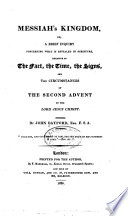 | 1853 - 636 pages
...thither, Greek was the language most generally used and best understood. It is plain, therefore, that at the end of the second and the beginning of the third century the Latin was not esteemed to be a sacred language even in Italy, or to be used any where in preference... | |
 | Samuel Miller - Art, Modern - 1805 - 422 pages
...poet is said, by those who believe in the authenticity of the poems in question, to have flourished about the end of the second and the beginning of the third century. who even placed Ossian on the same shelf with Homer and Virgil ; who dwelt with rapturous praise on... | |
 | Scepticism - 1814 - 258 pages
...256. It runs thus—" Amongst them," says Eusebius, speaking, of thft books which were published in the end of the second, and the beginning of the third century, " there is found a volume written against the heresy of Artemon, which Paulus of Samosata in our days... | |
 | Tract societies - 1814 - 630 pages
...Spain, and the Celiick nations.-^- By the were meant the people of Germany, Gaul, and Britain. J 3. At the end of the second and the beginning of the third century (AD 193—220) Tertullian mentions among the Christian converts Hispaniarum omnes termini, et Galliarum... | |
 | Thomas Burgess - Church history - 1815 - 372 pages
...the Celtlck nations *. By the K&TOI were meant the people of Germany, Gauli and Britain .f. (3.) At the end of the second and the! beginning of the third Century, (AD 193 — 220.) Tertullian mentions among the Christian converts, Hispaniarum omnes ter» mini, et... | |
 | Andrews Norton - Religious education - 1818 - 1164 pages
...without a conflict. He had previously said,* that there are no traces of our present Gospels before the end of the second and the beginning of the third century. About that time, according to him, " the Church," or " the age," first labored to procure their general... | |
 | John Bayford - Second Advent - 1820 - 366 pages
...the purity of the gospel declined, the colour of the fiery horse was developed. Towards the latter end of the second, and the beginning of the third century, the spirit of intolerance was manifested ; but the perilous circumstances of the Church, still exposed... | |
 | John Bayford - 1820 - 364 pages
...the purity of the gospel declined, the colour of the fiery horse was developed. Towards the latter end of the second, and the beginning of the third century, the spirit of intolerance was manifested ; but the perilous circumstances of the Church, still exposed... | |
 | Richard Mant - Apostles - 1828 - 634 pages
...Constantinople, flourished in the latter part of the fourth century. Clement of Alexandria, flourished at the end of the second and the beginning of the third century. Clement of Rome, a contemporary of the Apostles. Bishop of that see nine years, from 93 to 102. Cyprian,... | |
 | George Waddington - Church history - 1831 - 338 pages
...ascertain the precise moment of its commencement. But a candid inquirer cannot avoid perceiving that, about the end of the second and the beginning of the third century, some changes had taken place in the ecclesiastical system which indicated a departure from its primitive... | |
| |